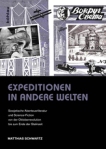Regular readers will be delighted to learn of two new (both 2014) publications in the field of Russian science fiction studies.  The first is Nikolai Krementsov’s long-awaited survey of the interaction between early Soviet science and fiction, Revolutionary Experiments: The Quest for Immortality in Bolshevik Science and Fiction. See full details and order a copy from the publisher’s website, here. The cover illustration looks as if it may owe some inspiration to this blog’s home image!
The first is Nikolai Krementsov’s long-awaited survey of the interaction between early Soviet science and fiction, Revolutionary Experiments: The Quest for Immortality in Bolshevik Science and Fiction. See full details and order a copy from the publisher’s website, here. The cover illustration looks as if it may owe some inspiration to this blog’s home image!
 The second book is equally long-awaited and fascinating (although unfortunately, for now, available only in German): Matthias Schwartz’s Expeditions into Other Worlds: Soviet Adventure Literature and Science Fiction from the October Revolution to the End of the Stalin Era. Here is the publisher’s blurb in English translation:
The second book is equally long-awaited and fascinating (although unfortunately, for now, available only in German): Matthias Schwartz’s Expeditions into Other Worlds: Soviet Adventure Literature and Science Fiction from the October Revolution to the End of the Stalin Era. Here is the publisher’s blurb in English translation:
Adventure literature and science fiction were among the most popular literary genres in the Soviet Union. It was within these genres that collective desires and fears about the present could be projected onto distant and exotic worlds. At the same time, this “literature of the masses” was very controversial. Adventure literature was regarded as ideologically problematic colonial literature, while science fiction was seen as challenging the official optimism about science and the future. This volume is the first to take an in-depth look at this neglected field of popular literature. The author reconstructs the journalistic and internal debates around the genres’ creation and presents a selection of texts that reveal the changing poetics within this field. He thereby provides fundamental insights into the operation and aporias of Soviet cultural policy. You can order a copy here.
Matthias Schwartz is a scholar of Slavic studies and a historian. He is currently a researcher at the Centre for Literary and Cultural Research (ZfL), Berlin. Nikolai Krementsov is a professor in the Institute for the History and Philosophy of Science and Technology at the University of Toronto.
MM
